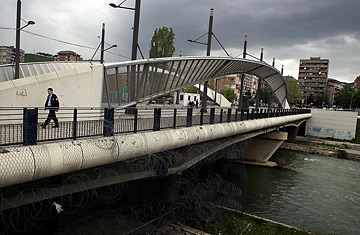
A Kosovo police officer patrols the main bridge of the ethnically divided town of Mitrovica. The Ibar River, which runs through Kosovska Mitrovica, and its main bridge split sthe Serb-populated north and the Albanian southern part of the town, thus becoming a symbol of the ethnic divisions across Kosovo.
Mitrovica, a scrubby mining town in northern Kosovo, sits squarely on the fault line between the independence-seeking ethnic Albanian majority to the south, and the loyalist minority Serbs in the north. Even in the city, the two communities are divided by the muddy Ibar River and joined by a bridge which few, apart from U.N. peacekeepers, dare to cross. Since 1999, when NATO pushed Serbian troops out of Kosovo, there have been several violent clashes on the bridge, and occasionally, potshots fired from both sides. The Dolce Vita, which overlooks the bridge from the Serb side, was also targeted: last year, nine people were injured in a hand grenade attack.
During the four days of the festival, however, the Dolce Vita's usual patrons — burly young men in tracksuits who call themselves "bridge watchers" — were outnumbered by jazz fans. "We've got some big names this year," says Petar Rakic, a jazz enthusiast who started up the festival in 2002, referring to Peter Harell, the U.S.-based trumpet player, and the French guitar virtuoso Bireli Lagrene, among others. But like in previous years, ethnic Albanians were unwelcome, either as players or in the audience. "They'd be eaten alive," Rakic says.
Not that ethnic Albanians are particularly keen to come, either. In the teeming Blue Note Bar on the other side — which bears little resemblance to its New York namesake — most youngsters were not even aware of the festival. "Maybe I'd go if I knew I would be safe", says 17-year-old Afrim, a high school student who refused to give his last name. Afrim says he has a few Serbian friends across the bridge. "We sometimes meet and hang out, but we have to be very careful not to be seen together."
What would happen if they were discovered?
"We'd been beaten up," he replies. "Or worse."
The jazz festival was staged against a backdrop of mounting tension caused by moves in the U.N. Security Council to decide Kosovo's future. The U.S. and the European Union want to grant Kosovo independence, according to the plan drawn up by U.N. special envoy Martti Ahtisaari. Russia, Serbia's traditional ally, advocates prolonged negotiations between the Serbs and ethnic Albanians, and has implied it might veto the independence plan. The Security Council is expected to vote on the matter within weeks.
Last Friday, the opening day of the festival, a convoy of white cars carrying U.N. ambassadors on a fact-finding mission, whizzed through Mitrovica. The roadside banner on the Serbian side, written in Russian, said "Please help us, Russian brothers." Another one, in English, said "In the name of God and justice, do not give our Holy Land as a present to the Albanians."
Although the festival passed peacefully, not even the international language of jazz could bridge the gap between the two communities. But there was at least one noble attempt: At the crack of dawn on Monday, after the Dolce Vita jam session was over, a lonely figure walked across the bridge. "As a Christian and a human being, I felt an urge to reach out to another side and touch someone," said Slobodan Trkulja, a Serbian saxophone player who now mostly lives in Holland. "It's not normal for humans to live so close to each other and be so separated."
On the south side, Trkulja met Hasan, an ethnic Albanian police officer. "I introduced myself, we shook hands, and chatted for a while. It turned out that he also plays an instrument — an Albanian version of the tambourine. And then he escorted me back across the bridge," Trkulja told TIME. "That was all." Upon his return, the crowd in the Dolce Vita started a debate whether his short walk was courageous or just plainly foolish. In today's Kosovo, even simple acts of decency can be labeled as both.
